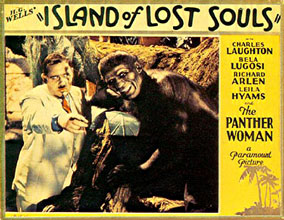
3359 ARMY (cesar chavez) ST. @ MISSION in SAN FRANCISCO
Island of Lost Souls, a masterpiece of '30s horror. Filled with dank jungle settings, dark caves, and huge mutant plants, Island of Lost Souls percolates with a decadent atmosphere that charms while it also horrifies. With genre director Erle C. Kenton at the helm, the island becomes a sinister, vile environment of creeping shadows that infiltrate right into the souls of the characters on screen. When the shipwrecked Edward Parker, (Prendick in the novel) is abandoned on his South Seas island, Moreau (Charles Laughton) doesn't want any prying eyes on his jungle paradise where he conducts medical experiments on animals, but he quickly sees that Parker might serve a useful scientific purpose. Taking a sadistic glee in his enterprise, he eagerly pushes the shipwrecked Parker together with the almost-human panther woman (Kathleen Burke) in hopes that the two might just sire a child. He waits in the shadows, carefully underplaying his part, while watching his plot take form. His eyes take on a sparkling glee. Laughton's performance is one of the great performances in the history of screen horror as he leads Parker around his island, cracking a whip to scare off hulking vaguely-human brutes who leer from the shadows. Meanwhile, agonized screams echo and the creatures cower while bleating "The... House of Pain!" Based on H.G. Wells's tale of horror, Island of Lost Souls boasts a screenplay by Philip Wylie, the marvelous cinematography of Karl Struss, one of the great cinematographers of Hollywood, a wonderful performance by Bela Lugosi as the "Sayer of the Law," meet who chants "What is the Law?" to a goofy, but creepy bunch of barrel-chested "beast men." One of the beasts in one delightfully decadent scene climbs a tree so he can crawl through a window and into her bedroom. The revenge of the animal-men is one of the most frightening scenes ever filmed for any movie. It got the film banned in Britain until some 25 years after its initial release


No comments:
Post a Comment